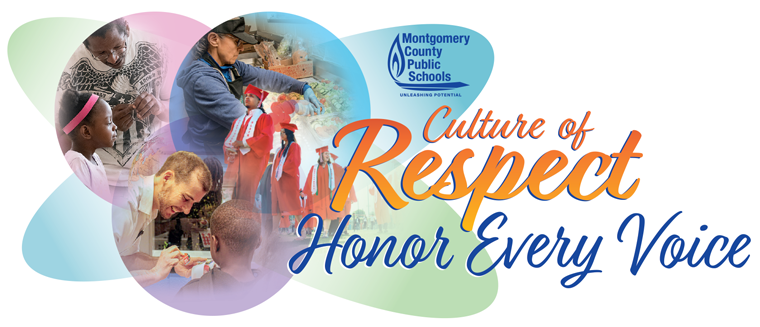 MONTGOMERY COUNTY PUBLIC SCHOOLS
MONTGOMERY COUNTY PUBLIC SCHOOLS
 MONTGOMERY COUNTY PUBLIC SCHOOLS
MONTGOMERY COUNTY PUBLIC SCHOOLS
 The Board of Education, the superintendent, the executive staff, and the organi- zations representing our diverse workforce affirm our commitment to fostering an inclusive, equitable, and respectful educational community. We recognize every individual’s role in contributing to a culture that not only sets high stan- dards for staff and students alike but also actively promotes anti-racism, equity, and inclusion at every level of our organization. We provide every student with a high-quality education by working together through continuous improvement, effective communication, and meaningful involvement in decision-making. We are committed to a shared responsibility and a collaborative partnership inte- grated into an organizational culture of respect.
The Board of Education, the superintendent, the executive staff, and the organi- zations representing our diverse workforce affirm our commitment to fostering an inclusive, equitable, and respectful educational community. We recognize every individual’s role in contributing to a culture that not only sets high stan- dards for staff and students alike but also actively promotes anti-racism, equity, and inclusion at every level of our organization. We provide every student with a high-quality education by working together through continuous improvement, effective communication, and meaningful involvement in decision-making. We are committed to a shared responsibility and a collaborative partnership inte- grated into an organizational culture of respect.
Between: Montgomery County Educational Association (MCEA), Montgomery County Association of Administrators and Principals/Montgomery County Business and Operations Administrators (MCAAP/ MCBOA), Service Employees International Union (SEIU) Local 500, and the Board of Education with the Superintendent of Schools.
We are dedicated to nurturing an organizational culture of respect, inclusivity, and continuous improvement. This culture is grounded in the belief that our strength lies in our diversity, encompassing all identities, backgrounds, and perspectives. A respectful work environment among staff, models respectful and inclusive classrooms for our students. Our commitment is to:
There is a commitment to fostering and sustaining a culture of respect through systemic support and structures. To be effective, these supports and structures should be systematically embedded throughout the system, visible and accessible to everyone, and seen as fair and equitable. To ensure this culture is promoted throughout the school system, time is needed for collaboration, training, and professional development. Prioritizing resources is necessary to accomplish this commitment. To effectively embed this culture across our system, we are imple- menting supports and structures that are visible, accessible, and equitable for all. These include:
In an organizational culture of respect, individuals are aware of and understand the impact of their behavior and decisions on others. We expect that the actions and behaviors of all individuals and groups are consistent with and reflect this organizational culture. The actions listed below represent expected behaviors:
To uphold our commitment to an inclusive, equitable, anti-racist culture, we will establish a transparent pro- cess for reporting violations of this compact. This includes clear channels for reporting issues, a commitment to timely and fair resolution, and multiple accountability measures, including climate survey and retention data, to ensure continuous improvement.
Together, we are committed to creating a respectful, inclusive, and equitable educational community that supports the success of every employee and student and actively challenges inequities and discrimination. This compact is a living document and is open to continuous refinement as we learn and grow together in our journey towards a truly inclusive culture that promotes a positive work environment ensuring the success of each employee, high student achievement, and continuous improvement in a self-renewing organization.